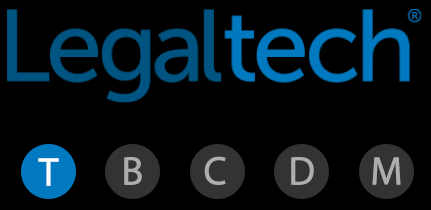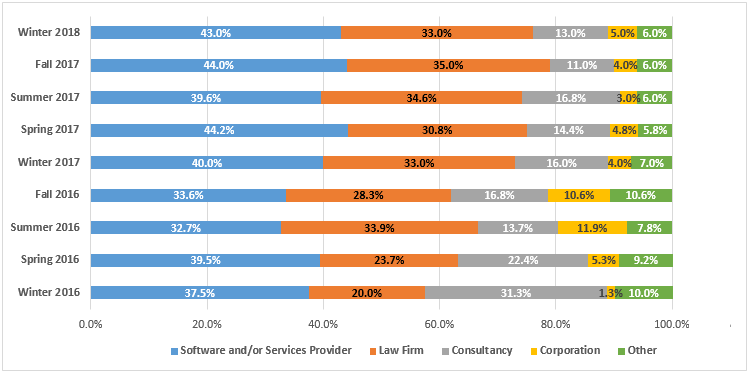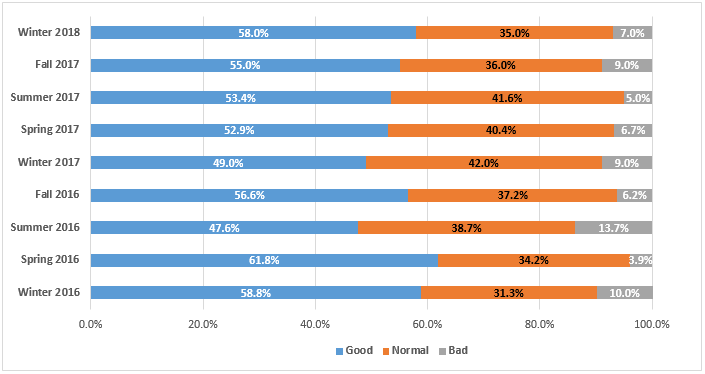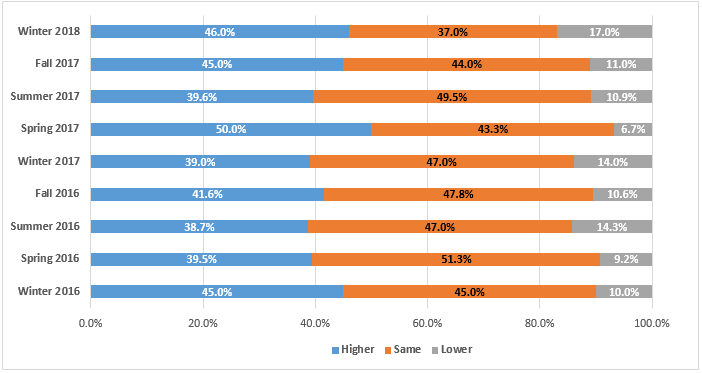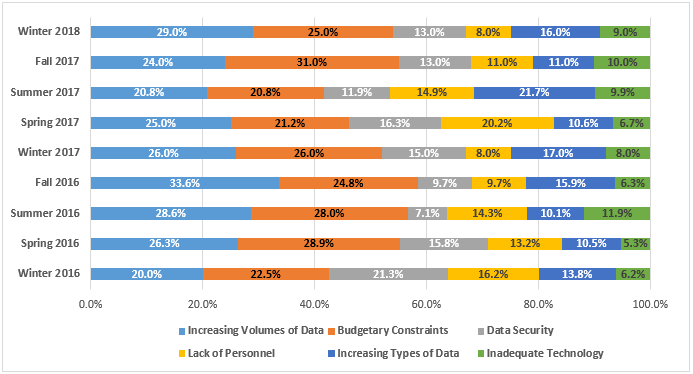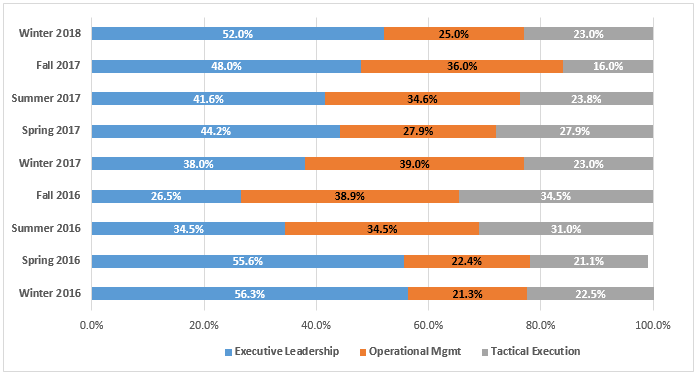Wednesday LTNY 2018 Sessions: eDiscovery Trends
As noted yesterday, Legaltech® New York (LTNY) is happening this week and eDiscovery Daily is here to report about the latest eDiscovery trends being discussed at the show. There’s still time to check out the show if you’re in the New York area with a number of sessions available and over 200 exhibitors providing information on their products and services, including our company, CloudNine at booth #533.
While at the show, we will (for the eighth year in a row!) be interviewing several industry thought leaders to see what they think are the significant trends for 2017 and, which of those are evident at LTNY. After the show, we will announce the series of thought leader interviews and identify when each will be published, so mark your calendars!
I would be remiss if I didn’t also mention that CloudNine and ACEDS is hosting Drinks with Doug (that’s me!) and Mary (as in Mary Mack, Executive Director of ACEDS) and Marc Zamsky (from ComplianceDS) at Ruth’s Chris Steak House at 148 West 51st Street on Wednesday from 4:00pm to 6:00pm. Online registration is closed, but you can join the waiting list here if you’re at the show and want to attend. Come join us!
There are plenty of interesting sessions today. Sessions in the main conference tracks include:
9:00 – 10:00 AM:
Legaltech Keynote – The ESI of Today and the ESI of Tomorrow
The Legaltech Judges Panel returns for 2018 to examine critical issues in ESI:
- Rule 34(b) Implications: why are courts still struggling with lawyers who don’t know the rules have changed and why lawyers are still struggling with “reasonable time specified to respond”
- Rule 502(d) Non-Waiver Option
- ESI sources: now that we routinely deal with email, text messages and mobile discovery, what is happening with data sources like Bluetooth connections, wearables, medical devices or smart home video?
- Will we see lawyers subpoena the connected car for its sensor data? How will a warrant be served on home appliances?
- How to manage consumers’ expectations on privacy with these new ESI sources
Speakers to include: Moderator: Patrick Oot, Partner, Shook Hardy & Bacon; Panelists: Hon. Andrew J. Peck, United States Magistrate Judge, Southern District of New York, Hon. Xavier Rodriguez, United States District Judge, Western District of Texas, Hon. Joy Flowers Conti, Chief District Judge – U.S. District Court, Western District of Pennsylvania, Hon. William Matthewman, United States Magistrate Judge, Southern District of Florida.
11:00 AM – 12:00 PM:
The Role of Artificial Intelligence in Legal and Business Processes and How to Defend Its Use
A panel of leading experts will discuss what AI is (and what it is not) and explain why legal and compliance professionals may be ethically required to understand and adopt this technology. Discussion points will include how to adequately understand the technology from a governance and controls point of view to be able to withstand regulatory scrutiny. The panel will also review how professionals are integrating big data and machine learning in e-discovery, compliance, and regulatory matters. Finally, the panel will share best practices for implementing the use of advanced technology to boost productivity and ensure the use of AI remains defensible.
Speakers to include: MODERATOR: Amy Hinzmann, Managing Director, Consilio LLC; SPEAKERS: Marla Crawford, Vice President, Associate General Counsel Legal and Regulatory Proceedings, Goldman Sachs; Christian Mahoney, Senior Staff Attorney, Cleary Gottlieb Steen & Hamilton LLP; Farrah Pepper, Executive Counsel, Discovery, GE.
Email Investigations with Machine Learning—See How it All Comes Together!
Tired of looking at Enron data? So are we! We’ve compiled intriguing data from high-profile FOIA releases to contextualize how leading practitioners are using visualizations, analytics, and AI as a force multiplier for investigations. Learn how phrase analysis, concepts, communication maps, Predictive Coding and other tools are helping lean teams find persons of interest and prove negatives fast.
Speakers to include: MODERATOR: Adam Kuhn, eDiscovery Attorney and Senior Product Marketing Manager, OpenText; SPEAKERS: Laura Roman, Litigation Operations and E-Discovery Specialist, NYSE; Mira Edelman, Director of eDiscovery Services, Facebook; Warren Singh, Supervisor of Practice Technology Consulting, Latham Watkins.
2018 Global Discovery: International Compliance in the Cloud
With the EU General Data Protection Regulation (GDPR) taking effect in May, the Schrems II litigation challenging the EU-US Privacy Shield Framework and standard contractual clauses, and the US Supreme Court considering the Dublin warrant dispute in United States v. Microsoft, 2018 promises to be an important year for international data law and cross-border e-discovery. With more organizations conducting e-discovery in the cloud, these developments take on even greater significance. Join us for a session examining legal and regulatory changes in store for 2018 and best practices for compliance in the cloud.
Speakers to include: SPEAKERS: Chris Dale, eDisclosure Information Project; Meribeth Banaschik, Partner, EY Germany GmbH; Johnny Lee, Principal, Practice Leader, Forensic Technology, Forensic Advisory Services, Grant Thornton; Rachi Messing, Senior Program Manager, Microsoft; Steve Couling, Vice President of International, Relativity.
Leveraging IG Practices to Prepare for the GDPR
Any seasoned legal, technology, or data professional knows that an effective IG strategy is a key weapon when addressing new compliance regulations. Accordingly, with the General Data Protection Regulation (GDPR) coming into effect in May 2018, many multinational companies are refocusing their data protection, privacy, and IG efforts. Organizations with well-developed IG programs will be more prepared to deal with stringent GDPR requirements such as the right to be forgotten, the right to data access, and the right to data portability and consent to the use of personal data. This session will focus on areas of overlap between IG practices and the GDPR and reiterate how the GDPR is another compelling reason to develop an IG framework in your organization. Topics covered will include:
- How implementing IG best practices improves an organization’s GDPR compliance posture
- How to leverage data security practices to ensure appropriate protection of personal data under the GDPR
- How data remediation can help mitigate GDPR non-compliance risks
Speakers to include: MODERATOR: Aaron Gardner, Vice President, Enterprise Solutions, KLDiscovery; SPEAKERS: James Sherer, Partner, BakerHostetler; Derek Silverman, Vice President, eDiscovery Counsel, Barclays; Brian Hengesbaugh, Partner, Baker & McKenzie LLP.
1:15 – 2:15 PM:
An Introduction to Technology-Assisted Review (TAR)
A panel of industry leaders discuss Technology Assisted Review and its practical application in today’s discovery process. Panelists ranging from corporate counsel to attorney practitioners will discuss handling historical objections, how to overcome impediments and where they are seeing the most practical adoption of TAR in everyday use. The panel will also examine practical use of TAR beyond predictive coding and offer a glimpse at the future.
Speakers to include: MODERATOR: Shamus Flower, Senior Vice President, Consilio LLC; SPEAKERS: John Koss, Special Counsel, E-Discovery, Mintz Levin Cohn Ferris Glovsky and Popeo PC; Judith Beall, Associate General Counsel & Senior Vice President, Bank of America; Danielle Panetta, Attorney, Goodwin Procter LLP; Brian Chebli, Executive Director & Assistant General Counsel – JPMorgan Chase & Co.
Where’s our Flying Car? Charting a Path to Secure, Seamless Enterprise Discovery
In our 2017 survey, 74% of corporate legal ops professionals say it would benefit the entire legal department if ECM were integrated with eDiscovery, yet the silos persist and grow! How can we make real progress on IG, InfoSec, and repeatable discovery processes in an ever-evolving information climate? Learn how eDiscovery leaders are uniquely positioned to help drive consensus and solve these challenges.
Speakers to include: MODERATOR: Hal Marcus, eDiscovery Attorney and Product Marketing Executive, OpenText; Jay Brudz, Partner, Drinker Biddle & Reath LLP; Bennett Borden, Chief Data Scientist and Chair, Information Governance and eDiscovery Group, Drinker Biddle & Reath LLP; Ethan Ackerman, Associate, Morgan Lewis; Sharika de Freitas, Senior Manager of Discovery Solutions & Technology, Viacom.
From AI to e-Discovery: Innovation in Legal and Technology Education
Technology has been one of the driving forces behind profound changes in legal education, and e-discovery education has become an important part of law school curricula around the nation. In this div, directors of law school e-discovery programs will discuss their programs and what they see as the future of legal education.
From artificial intelligence to distance learning about the law and technology to law school programs dedicated to e-discovery, legal education is changing at a rapid pace. As more states add technology competency requirements for attorneys, how will the profession meet these challenges? Whether you’re a lawyer, paralegal, or litigation support professional, join us for this session as a noted U.S. district judge who teaches e-discovery law, prominent law professors, and the executive director of the national e-discovery certification association discuss how you can keep up with requirements for legal and technical education—while making some predictions about how legal and tech training will be done in the future.
Speakers to include: MODERATOR: David Horrigan, Discovery Counsel & Legal Education Director, Relativity; SPEAKERS: Honorable Xavier Rodriguez, US District Judge (W.D. Tex.) and Adjunct Professor of Law, St. Mary’s University School of Law; Mary Mack, Executive Director, Association of Certified E-Discovery Specialists (ACEDS); Daniel Martin Katz, JD, PhD, Associate Professor of Law and Director, The Law Lab, IIT Chicago-Kent College of Law; William Hamilton, Legal Skills Professor and E-Discovery Project Executive Director, University of Florida Levin College of Law; Laura Norris, Assistant Clinical Professor, Santa Clara University School of Law and Director, Entrepreneurs’ Law Clinic.
Dealing with Difficult Data: Collecting and Reviewing Complex Data from Challenging or Emerging Locations
Text messages, social media data, mobile devices, audio files, Office 365, archives, databases. Data containing PII or PHI. Multilingual data.
What must in-house attorneys and outside counsel do to adapt to the new information landscape? How can you avoid data loss or simply overlooking an emerging data type? How do you handle privacy concerns in international collections? What tools and technologies can assist if you decide to collect data using in-house resources? How can analytics help with the review of uncommon data types?
Speakers to include: MODERATOR: Julian Sheppard, KLDiscovery; SPEAKERS: Wendy Curtis, Chair of eDiscovery & Information Governance, Orrick; Jason Lichter, Director of Discovery Services & Litigation Support, Pepper Hamilton; Marla Crawford, Vice President, Associate General Counsel, Goldman Sachs; Kamal Gad-el-Hak, Information Risk Consultant, MassMutual.
2:45 – 3:45 PM:
Looking Ahead: How to Get the Most Out of TAR 2.0
Much has changed since TAR first gained judicial approval in the landmark 2012 Da Silva Moore v. Publicis Groupe decision. This panel will consider how TAR’s capabilities have grown over the last few years, evolving from an inscrutable “black box” to a powerful technology that can drive litigation strategy. In this session, attendees will learn key workflows for optimizing the use of TAR, accelerating document review and ensuring defensibility as our expert panelists discuss advanced TAR 2.0 workflows.
Speakers to include: MODERATOR: Xavier Diokno, Director Data Analytics, Consilio LLC; SPEAKERS: Michelle Briggs, Counsel, Goodwin Procter LLP; Dave Lewis, Chief Data Scientist, Brainspace Corporation; Martha Louks, Director of Discovery Services, McDermott Will & Emery LLP; Matthew Poplawski, Senior e-Discovery Attorney, Winston & Strawn.
The Intersection of Data Privacy, Security, and Investigations: What Law Firms Need to Know
It all comes down to data—securing it, collecting it, investigating it—and that comes down to the endpoint. Endpoint visibility is the cornerstone of incident avoidance and response, as well as the starting point for fact investigations and eDiscovery. Learn how data privacy, security, and investigation are converging, creating risks and opportunities for corporations and the law firms that counsel them.
Speakers to include: MODERATOR: Charles Choe, Senior Product Marketing Manager, OpenText; SPEAKERS: Kari Rollins, Partner, Sheppard Mullin; Darin Sands, Shareholder/Partner, Lane Powell PC.
From the Iron Rooster to Amazon Alexa: Mobile Discovery and the Internet of Things
Whether it’s missing mobile data (Montgomery v. Iron Rooster-Annapolis, LLC), digital data in a truck (Below v. Yokohama Tire Corp.), Fitbit data (State v. Dabate), or data from an Amazon Alexa (State v. Bates) mobile discovery and data from the Internet of Things (IoT) devices present challenges, not only for litigants and their lawyers, but for corporate organizations, paralegals, and technologists as well. In this session, lawyers and consultants, including a former Department of Justice cybercrime coordinator, a prominent discovery attorney, a corporate information governance expert, and a leading legal industry analyst, will address the legal, technical, and practical considerations of mobile, social, and IoT data, including preservation requirements and data privacy limitations.
Speakers to include: MODERATOR: David Horrigan, e-Discovery Counsel and Legal Content Director, Relativity; SPEAKERS: Ari Kaplan, Principal, Ari Kaplan Advisors; Kelly Twigger, Principal, ESI Attorneys LLC; Ed McAndrew, Partner, Ballard Spahr LLP; Jake Frazier, Senior Managing Director, FTI Consulting.
The Metrics Don’t Lie: Alternative Ways to Measure eDiscovery Provider Performance & Value
eDiscovery technologies and processes continue to evolve. However, the economics of discovery remain largely unchanged, with costs spiraling upwards. Legal service providers are not incentivized to tackle the main driver of cost: the exponential growth of data. Savvy businesses have successfully moved law firms away from the billable hour. Surprisingly, many businesses continue to negotiate unit rates for eDiscovery projects, allowing discovery providers to increase their profit margins.
By adopting new ways to measure eDiscovery effectiveness, businesses can better understand how to manipulate the levers that defensibly drive significant cost reduction. During this hands-on workshop, professionals in legal and procurement will work through a structured methodology to:
- Understand the true cost of discovery
- Share best practices for managing the efficiency of the discovery process
- Define quantitative metrics that will hold providers to new performance standards
- Explore and establish alternative fee arrangements to drive substantial cost savings and provide true cost predictability
Speakers to include: MODERATOR: Geoff Wilcox, Managing Director, UnitedLex; SPEAKERS: Constance Mockaitis, Senior Manager, Information Governance & eDiscovery Operations, AbbVie; Brett Burney, eDiscovery Consultant, Burney Consultants; William Gratsch, Associate Director, Legal Operations, Ally; Charisma Starr, Legal Information Systems, Legal Operations and Administration, Exelon.
A Day in the Life of a Futurist Jurist Empowered by Artificial Intelligence: An Ethical Dilemma
The practice of law is poised for radical change. The use of machine learning algorithms in discovery is only the beginning of how Artificial Intelligence (AI) could possibly impact the legal industry in years to come. However, these changes pose significant ethical dilemmas for legal practitioners. This session will look into the future at the day in the life of an attorney empowered by artificial intelligence, and the ethical challenges associated with AI. How will today’s use of predictive coding and discovery analytics propel tomorrow’s lawyers to leverage AI in alternative applications across the entire legal process? Specific topics will include:
- Legal ethics scenarios involving the use of AI
- Current limitations of AI
- Future of AI in the legal industry
Speakers to include: MODERATOR: Anthony DeJohn, KLDiscovery; SPEAKERS: Ralph Losey, Principal, Jackson Lewis PC; Shannon Copone Kirk, E-Discovery Counsel, Ropes & Gray; Martin Tully, Litigation Partner, Akerman.
In addition to these, there are other eDiscovery-related sessions today. For a complete description for all sessions today (and for the entire show, since they’re all on one page), click here.
So, what do you think? Are you planning to attend LTNY this year? Please share any comments you might have or if you’d like to know more about a particular topic.

Sponsor: This blog is sponsored by CloudNine, which is a data and legal discovery technology company with proven expertise in simplifying and automating the discovery of data for audits, investigations, and litigation. Used by legal and business customers worldwide including more than 50 of the top 250 Am Law firms and many of the world’s leading corporations, CloudNine’s eDiscovery automation software and services help customers gain insight and intelligence on electronic data.
Disclaimer: The views represented herein are exclusively the views of the author, and do not necessarily represent the views held by CloudNine. eDiscovery Daily is made available by CloudNine solely for educational purposes to provide general information about general eDiscovery principles and not to provide specific legal advice applicable to any particular circumstance. eDiscovery Daily should not be used as a substitute for competent legal advice from a lawyer you have retained and who has agreed to represent you.

